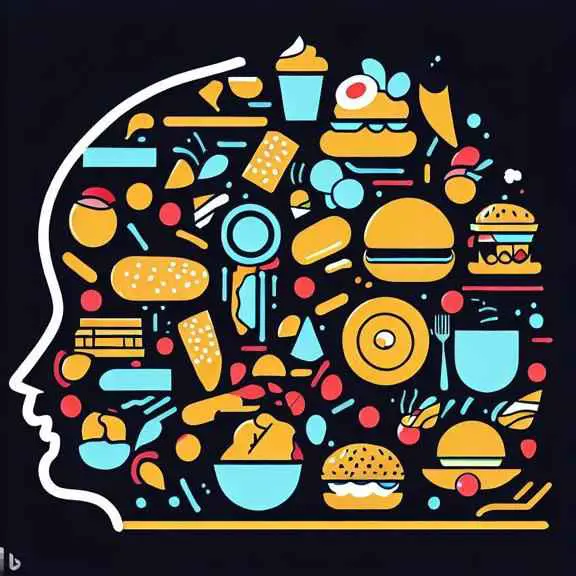Paragraph on
Food Habit
for all Class, Words
by Food on
Eating is a basic human need, but how we eat and what we eat can vary greatly depending on our food habits. In many cultures, food is not…, please continue reading.

Table of Content
Ad
The Paragraph on Food Habit
Ad
Eating is a basic human need, but how we eat and what we eat can vary greatly depending on our food habits. In many cultures, food is not just sustenance, but a representation of one’s identity and history. Our food habits are largely formed by our background and upbringing, but they can also be influenced by our health, lifestyle, and personal beliefs.
For instance, some people follow a vegetarian or vegan diet due to ethical or health reasons, while others prefer a low-carb or low-fat diet for weight management. Some may have a sweet tooth, while others prefer salty or spicy food. Moreover, food habits can also be affected by external factors such as availability, affordability, and convenience.
By examining our food habits, we can gain insight into our own identity and values, as well as learn to respect and appreciate the diversity of food cultures around us. We can also make informed choices about our food consumption based on our health and wellness goals.

Questions about Food Habit
Ad
Questions and Answers:
- What are food habits?
A: Food habits refer to the eating patterns and preferences of individuals and communities.
- What factors can influence our food habits?
A: Our food habits can be influenced by our background, upbringing, health, lifestyle, personal beliefs, and external factors such as availability and affordability.
- What are some reasons people may follow a vegetarian or vegan diet?
A: People may follow a vegetarian or vegan diet due to ethical or health reasons.
- What is a low-carb or low-fat diet?
A: A low-carb or low-fat diet refers to a diet that focuses on limiting the intake of carbohydrates or fats, respectively, for weight management.
- What are some examples of external factors that can affect our food habits?
A: External factors that can affect our food habits include availability, affordability, and convenience.
- What can we learn from examining our food habits?
A: By examining our food habits, we can gain insight into our own identity and values, as well as learn to respect and appreciate the diversity of food cultures around us.
- Why is it important to make informed choices about our food consumption?
A: Making informed choices about our food consumption can help us achieve our health and wellness goals.
- What is a sweet tooth?
A: A sweet tooth refers to a preference for sweet food.
- What is a vegetarian diet?
A: A vegetarian diet is a plant-based diet that excludes meat and sometimes other animal products.
- What is the difference between a vegan and vegetarian diet?
A: A vegan diet is a plant-based diet that excludes all animal products, while a vegetarian diet may include some animal products such as dairy and eggs.

Vocabulary related to Food Habit
Ad
Vocabulary Words:
- Sustenance: Definition: food and drink regarded as a source of strength; Usage: The refugees were in desperate need of sustenance.
Synonyms: nourishment, food, provisions Antonyms: starvation, malnutrition
- Identity: Definition: the characteristics that determine who or what a person or thing is; Usage: The artist鈥檚 unique style is central to his identity.
Synonyms: individuality, distinctiveness, character Antonyms: sameness, conformity
- Upbringing: Definition: the care and training a child receives while growing up; Usage: Her strict upbringing had a lasting impact on her personality.
Synonyms: education, nurture, raising Antonyms: neglect, abuse
- Low-carb: Definition: a diet that emphasizes the reduction of carbohydrates; Usage: Many athletes follow a low-carb diet to improve their performance.
Synonyms: reduced-carbohydrate, low-glycemic Antonyms: high-carb, high-glycemic
- Vegan: Definition: a person who does not eat or use any animal products; Usage: My sister has been a vegan for five years and loves it.
Synonyms: plant-based, cruelty-free Antonyms: omnivore, carnivore
- Ethics: Definition: moral principles that govern a person’s behavior or the conducting of an activity; Usage: The company’s ethics code prohibits discrimination of any kind.
Synonyms: morality, principles, values Antonyms: immorality, unethical behavior
- Lifestyle: Definition: the way in which a person or group lives; Usage: His nomadic lifestyle allowed him to travel the world.
Synonyms: way of life, habits, customs Antonyms: sedentary lifestyle
- Affordability: Definition: the quality of being priced reasonably; Usage: The company’s products are known for their affordability.
Synonyms: accessibility, reasonableness Antonyms: expensive, unaffordable
- Wellness: Definition: the state of being in good health, especially as an actively pursued goal; Usage: Her daily morning routine contributes to her overall wellness.
Synonyms: health, well-being, fitness Antonyms: illness, disease
- Diversity: Definition: the state of being diverse or varied; Usage: The university prides itself on the diversity of its student body.
Synonyms: variety, multiplicity, heterogeneity Antonyms: uniformity, homogeneity

Structure of the sample "Food Habit" paragraph
Ad
Cohesion and Coherence: In this paragraph, the topic of food habits is introduced as a means of exploring the different factors that influence how and why we eat. Each sentence builds on the previous one, creating a coherent and cohesive narrative that flows logically. The content is organized in a structured and systematic manner, with each sentence providing a clear and concise explanation of a specific aspect of food habits. Additionally, there is the use of transitional phrases like ‘for instance’ and ‘moreover’ to link the different ideas together and create a smooth and connected thought process throughout the paragraph.
